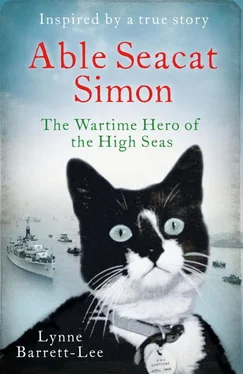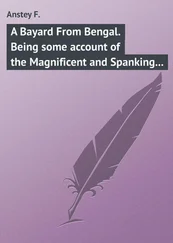‘To C in C,’ the captain said to Jack, when, by around four in the afternoon, the last drop was safely sloshing where it belonged. ‘ Fuel now on board. 54 tons. Operation commenced 05:00, finished at 16:00 hours, working nonstop throughout, 11 hours. They worked like TROJANS! ’ he finished. ‘And make sure that’s in capitals, Flags. What an excellent day’s work.’
There was further good news when a message arrived by boat a short while later in the form of a letter asking the captain to attend a meeting in Ching Kiang, the Communist People’s Liberation Army’s HQ, the following day.
‘Might this be it, sir?’ Hett asked him, as they gathered in the wireless room. ‘Might we finally be given permission to get away, do you think?’
‘I hope so,’ said Captain Kerans. ‘Let’s hope for the best, eh?’
But his expression told me the rest of what he was thinking. That at the same time, we should prepare for the worst.
The worst happened. Captain Kerans returned from the meeting stony-faced and sweating. Far from an agreement, he’d returned with yet another disappointment.
We might have oil, but they were still demanding an admission from the British Navy that not only had we fired first but that we shouldn’t have even been there. That we had no right to be in Chinese waters in the first place, which was patently untrue. But as the communists were now controlling more and more territory around the Yangtse, their implacable stance held more and more sway.
There was even more; the captain had asked about replenishing our food stores, and was told in no uncertain terms that, as foreign merchant ships were no longer permitted to travel up the Yangtse, any ship – or plane – that attempted to go anywhere near the Amethyst would immediately be destroyed.
‘And, of course, he reiterated his usual threat,’ the captain said gloomily. ‘The Amethyst will also be destroyed if we attempt to move it. So that’s that. Another deadlock. I’m sorry to have to say so, but if we’re going to play Kang at his own game, there’s no choice. It’s going to have to be half-rations from tomorrow.’
The strain of our continued confinement was now making its presence felt right across the ship. Like the ensign that still flew above us, the crew – me included, because I was now on half-rations too – were getting droopy and ragged. Even Peggy was beginning to wilt – and she was usually immune to the extremes of temperature. I’d often catch her standing by a guardrail, looking wistfully at the sludge-coloured water below us. ‘She’ll be in the river – you mark my words,’ Petty Officer Griffiths kept muttering. ‘She’ll be in. For two pins, she’ll be in, for a swim.’
Still, Peggy, who managed to resist the temptation (just – I had no similar compunction) did what she could to cheer our friends up, as did I. But while we could curl up with our friends in the mess and watch them settle down to sleep, Captain Kerans increasingly seemed preoccupied and distant, mooching around on his own at all hours of the day and night.
It wasn’t unexpected. After all, he’d been commanding a ship and crew in the most difficult and dispiriting conditions, and as the summer wore on the weather got even hotter, so keeping morale up among his young sailors must have been difficult.
With the daily grind being just that – a relentless and tedious round of mostly domestic drudgery – it was easy to forget the other spectre which still hung over the Amethyst : the fresh memories, there to stumble upon every time any of us passed over the quarterdeck – of the blood that had been shed and the lives that had been lost – of the friends we would never see again.
In the meantime, the game of what the captain had called ‘cat and mouse’ with the garrison commander, Kang, was still showing no signs of being resolved. I didn’t know which was which – who was the cat and who was the rodent? I hoped we weren’t the latter – but it was obvious that the repeated to-ings and fro-ings, to attend yet more lengthy and up to now largely pointless-sounding meetings, were beginning to try the captain’s patience to the utmost.
Either that, or he was doing what Jack had predicted we all might do before long, if we were stuck here much longer, and already ‘losing his marbles’. I wasn’t sure quite what that meant – couldn’t even begin to guess at it – but, judging by Jack’s expression when he’d said it, I suspected it wouldn’t be a pretty sight.
Perhaps Captain Kerans had already lost them. Whenever it was warm and dry (an extremely rare and welcome combination) I had lately taken to returning to one of my old favourite high places – the glass-topped magnetic compass and gyro up on the bridge, which had miraculously survived the shelling unscathed. It was here, one afternoon a couple of days later, that I was to witness first hand evidence that Captain Kerans’ ‘marbles’ might have already deserted him.
‘I need a detail of men mustered to deal with the blackout,’ he was telling Frank.
It was mid-July now, unbelievably. We’d been stuck here a whole two and a half months.
‘The blackout?’ Frank answered. He looked confused.
‘Yes, it’s not nearly good enough. Lights showing everywhere. We never seem sufficiently darkened at night. Something needs to be done about it.’
Petty Officer Frank adjusted his face into a configuration I recognised. One that said, ‘ Really , sir? You’re sure , sir?’ but without letting on.
‘The blackout, sir,’ he said. ‘Something needs to be done?’ Captain Kerans flapped a hand. ‘Yes, it does. We need more blackout tarpaulins made. Particularly aft. Stern to amidships. Have a group of men run some up. Lots of them.’
Frank’s expression must have registered with Captain Kerans as well. Even with the oil, the power was still off by dusk. The nights couldn’t be darker. He cleared his throat. ‘We need to keep the men busy, Frank. All this heat and lassitude is doing morale no good at all.’
‘Aye aye, sir,’ said Frank. ‘Excellent idea for the morale, sir.’ He bent his head to make a note of the instruction in his book.
‘And we need to reduce topweight. The ship’s very unstable. We need to strip down anything we can from the decks, particularly the upper decks – including removing some of the masts.’ He stopped then, perhaps noticing Frank’s look of increasing consternation. ‘They can be stored below,’ he added. ‘Again, it’s all work that will keep the men busy, Frank – stop them thinking quite so much about their empty stomachs.’
‘Aye, aye, sir,’ said Frank, once again scribbling furiously.
‘And another thing,’ said the captain. ‘The anchor.’
‘Sir? The anchor?’
‘The anchor, sir?’ echoed an equally bemused-looking Lieutenant Hett, who’d just joined them.
‘Yes, specifically the anchor chain,’ Captain Kerans repeated, looking like a man not to be messed with. ‘It needs a ruddy good greasing. Clangs about all the time – specially on these high tides. Makes one hell of a racket. Driving me mad, it is. And it’s only going to get worse if that typhoon comes along.’
He was talking about Typhoon Gloria, a storm that had been building, that Jack had already told me might be headed our way. I’d never seen a typhoon before but felt strangely unafraid of it. With so much on our plates already – not least so much to be afraid of – a typhoon, sent by Mother Nature, seemed quite a benign thing. At least it might help stir things up a bit.
‘The anchor chain, sir,’ Frank repeated, scribbling again. ‘Have it greased.’
‘Yes, a good quantity of grease and soft soap,’ the captain said. ‘That should do the job, I think. Oh, and while they’re at it, have them wrap it well in bedding. Decent amount of blankets. That should do it. Stop the ruddy thing clanking away and getting on my nerves.’
Читать дальше












